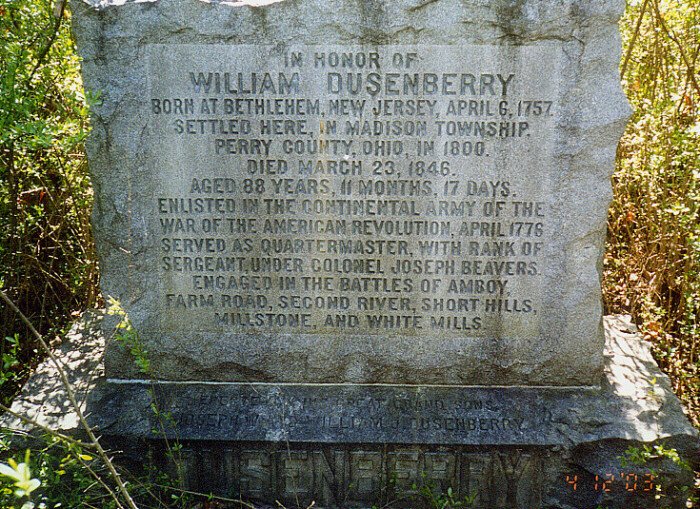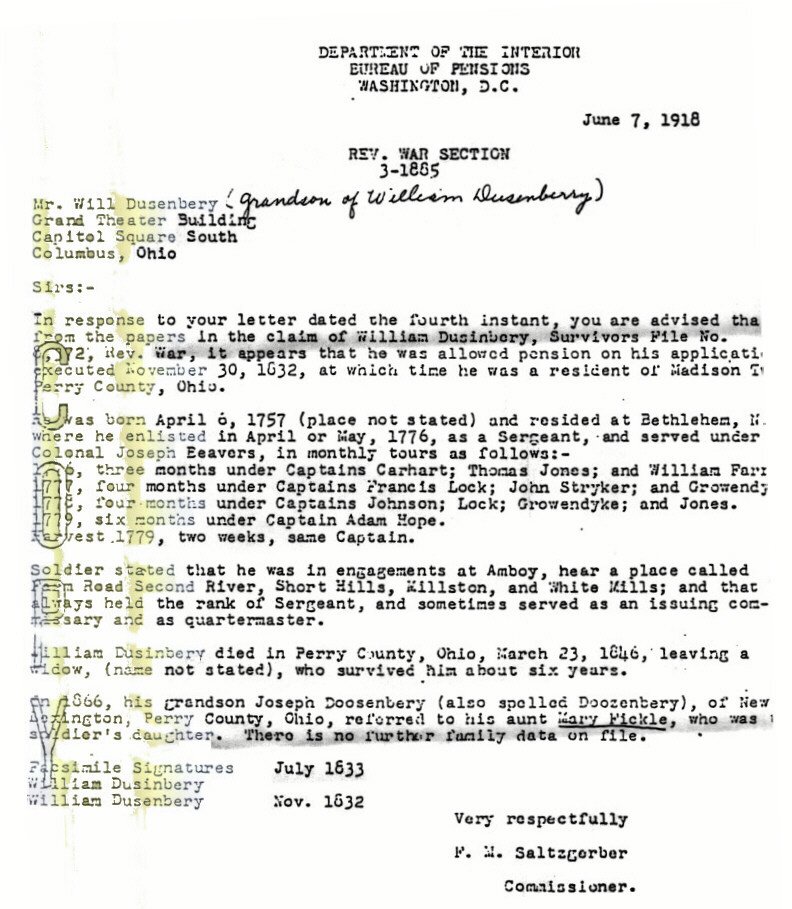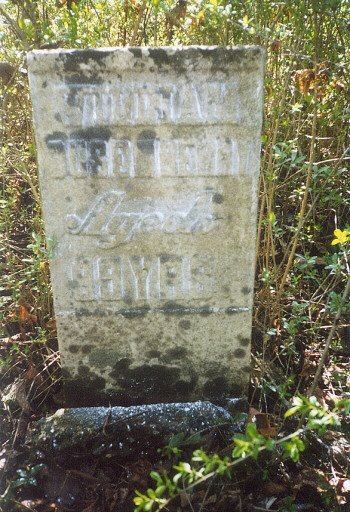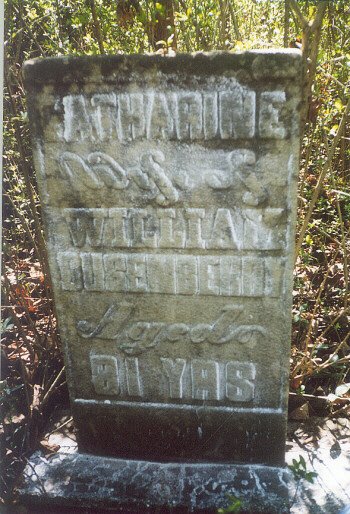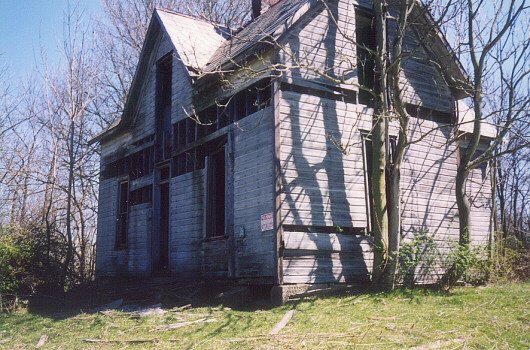William Dusenberry continued
William Dusenberry's memorial stone
In Honor of William Dusenberry, born at Bethlehem New Jersey April 6, 1757
Settled here in Madison Township Perry county in 1800
Died March 23, 1846 Aged 88 years 11 months and 17 days
Enlisted in the Continental Army of the War of the American Revolution April 1776
Served as Quartermaster with Rank of Sargeant under Colonel Joseph Beavers
Engaged in the Battles of Amboy, Farm Road, Second River, Short Hills, Millstone, and White Mills
William Dusenberry Pension Letter
William and wife Catherine's actual tombstones on the family farm
The old farm house on the old Dusenberry farm
Revolutionary War information:
William Dusenbury 4-6-1757
NJ died
3-23-1846 in Ohio Married Elizabeth Compton, 2nd
wife
Catharine Van Buskirk Sargeant Quarter
Master
PS New Jersey PNSR
History of Perry County
Madison Township is an original one in this county. It was settled
about 1800 or a little later by William Dusenberry. It is named after
James Madison and was organized soon after the county.
Will of William Dusenberry
deceased
transcribed from the actual will located in Muskingum county courthouse
by Sandra Quinn
In the name of God Amen, I William Dusenberry, in frail and
weak
state of body, but of sound and disposing mind, will and memory, do
hereby make known my last will and testament as follows:
1st To my son John Dusenberry, I give fifty acres of land, to my son
Benjamin Dusenberry, I give fifty acres of land, To my son in law John
Hummel I give fifty acres of land, to my daughter Elizabeth Henderson I
give fifty acres of land. To my son in law Benjamin Fickle I
give
fifty acres of land. To my daughter Catharine Wise I give
fifty
acres of land, To my son in law Jacob Hummel, I give fifty acres of
land and To my son in law Joseph Fickle, I give fifty acres of land and
for each of the above named bequests I have caused deeds to be
executed, Herin said land is signed and sealed the same and I
hereby authorize and require my executors hereinafter named to deliver
the said deeds immediately after my decease.
2nd- To my grandson Wiliam Dusenberry son of Benjamin Dusenberry, I
give and bequeath the south east quarter of the south west quarter of
section fourteen, in township fifteen of range fifteen in the district
of lands subject to sale at Zanesville, Ohio, for which I hold the
original patent.
3rd- I will that all the personal property I may possess at
my
decease money credits or effects be equally divided among my heirs to
wit: John Dusenberry, Henry Dusenberry, Benjamin Dusenberry, John
Hummel, Elizabeth Henderson, Benjamin Fickle, Catherine Wise, Jacob
Hummel and Jacob Fickle except only what will pay my just debts and
defray my funeral expenses.
4th- I do hereby nominate and appoint my son John Dusenberry and my
trusty friend William Moore my executor of this my last will and
testament and in testimony that this and only this is my last will and
testament.
I have hereunto set my hand and seal on
the thirteenth day of June in the year A. D. 1840.
William Dusenberry (Seal)
Signed and sealed in the presence of John Hammer, Barrett Hammer
In addition to the foregoing I will that
my wife
Catherine Dusenberry shall be allowed to reside in and enjoy the
mansion house and gardens where I now reside with all the household
goods I may possess at the time of my decease during all of her natural
life.
William Dusenberry (Seal)
Signed and sealed in the presence of John Hammer, Barrett Hammer
Excerpt from General Phil Sheridan as I Knew Him by Henry Greiner, 1908:
Page 14, 15, 16:
"............There is no excitement in Somerset, generally speaking,
except during a political campaign, a war, or a rumor of war, at which
times the people are thoroughly disturbed; but when the election
returns are all in, or the war over, every one resumes the even tenor
of his way. One does not see the worried faces and frenzied rush that
are encountered on every hand in the streets of the large metropolis.
No place can be more patriotic than this quiet little village. One of
my earliest recollections of little Phil Sheridan is of a Fourth of
July celebration we attended when he and I were about six or seven
years old. It might have been here that Phil received his first
military impulse and patriotic thrill.
A Fourth of July celebration was a great event at that time in our
village; every one patricipated in the exercises; not that we were more
patriotic then than now, but, there being fewer patriotic holidays, our
patriotism was more condensed. Early in the morning on these days long
trains of farmers' wagons would commence arriving, the head teams
carrying the fife, drum and flags. Long tables would be erected in the
most convenient groves for a grand dinner; all the uniformed military
companies of the county would be present, while a six-pounder brass
cannon the Reading hill would awaken us in the morning and continue its
salute until noon, when the grand dinner was prepared. The boys prided
themselves greatly on this brass cannon, and eagerly each year did they
throw themselves before the care of juggernaut (for the the cannon
caused many serious accidents) for the happy prominence of being of the
"Firing Squad")
The most attractive
feature in a
Fourth of July celebration was a decrepit Revoluntionary soldier by the
name of Dusenbury, who lived about six miles east of us in a hamlet
called Greasetown, from the greasy appearance of an old carding machine
and its greasy proprietor. The name of that hamlet is changed now to
Sego. This old soldier, growing yearly less able to attend the
celebrations, attracted much attention, as he was the last one in our
part of the county who had belonged to that immortal band of heroes of
'76.
The first time Phil and I
saw him he
was brought up in a farmer's wagon, seated on a split-bottom chair
(there were no buggies then and but few carriages). He was clad in a
new suit of homespun linen that, we were told, his old wife had spun,
wove and made for him. As the wagon drove into the grove it caused
something of a sensation, for you could see many who recognized him
gathering about the wagon to offer their services in assisting the
feeble old man to alight. When safely out, he was carefully led to the
platform occupied by our prominent citizens and speakers. The old,
tottering with age and infirmity, was given the place of honor -- the
observed of all observers.
While this was going on,
Phil
Sheridan, who was standing by my side, asked me who that old man was
and why every one was so glad to see him. I was prepared to answer the
question, for I had just heard the story from my elder brother. I told
Phil that his name was Dusenbury, he lived at Greasetown, had been a
soldier under Washington, and that 'Dan" told me he was in five
battles. He had belonged to the Horsemen.
I never saw Phil's brown eyes open so wide or gaze with such interest
as they did on this old revolutionary relic. I am sure it made a deep
impression on his boyish imagination, for he followed him to and from
the dinner table, and, when the exercises were over, we were still near
him. The patriotic impression he seemed to receive, as he looked with
awe and interest at the comrade of Washington, no doubt clung to him
through life and was probably the first glow of military emotion he
experienced.
When, some years later, the news was brought to our village that the
old soldier was dead, and that another firing squad was forming to go
down to fire a salute over his grave, Phil was the first among the boys
to propose that we walk down, which we did, but fortune favored some of
us in gaining a ride home on the cannon........."
William Dusenberry
genealogy and history presented by his ancestor granddaughter
Sandra Mitchell Quinn
http://oghen.net/ohperry
Continue to images of actual pension
